Strategic HR Solutions: Motivation, Performance & Succession Planning
VerifiedAdded on 2023/06/12
|16
|1097
|225
Presentation
AI Summary
This presentation addresses critical HR challenges such as absenteeism, low productivity, and negative media attention. It proposes strategies to improve employee motivation through intrinsic and extrinsic rewards, increase employee engagement, and align personal and organizational goals. Performance improvement strategies include transparent feedback, setting KPIs, and enhancing the workplace environment. Employee retention is addressed through aligning goals, transparent communication, and work-life balance. The presentation also covers succession planning, talent management, improved organizational culture through open communication, and employee safety measures. Strategies for a positive public image, addressing insubordination, and the desired qualities in an HR director are also discussed, including a potential candidate identified through LinkedIn.
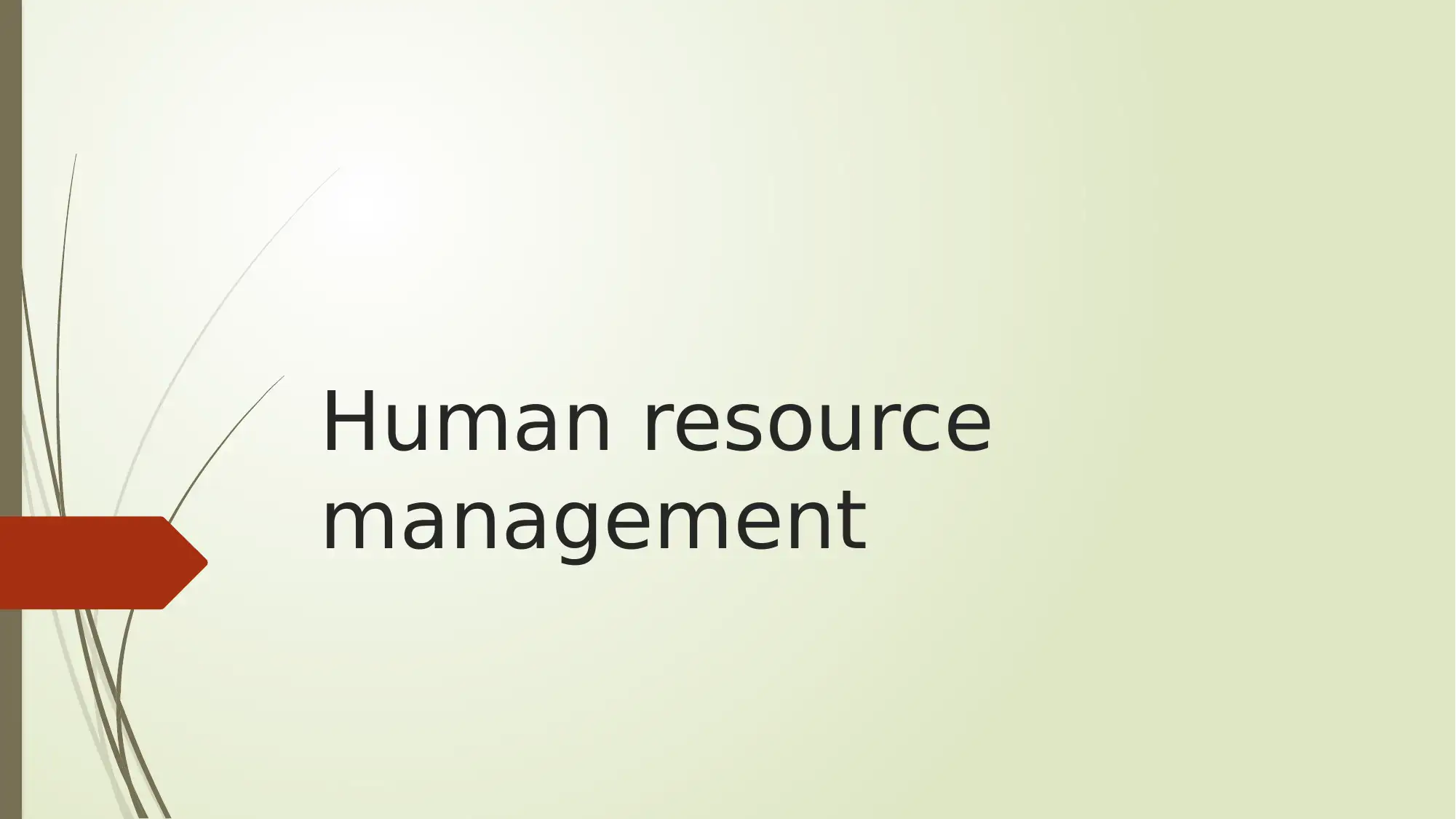
Human resource
management
management
Paraphrase This Document
Need a fresh take? Get an instant paraphrase of this document with our AI Paraphraser
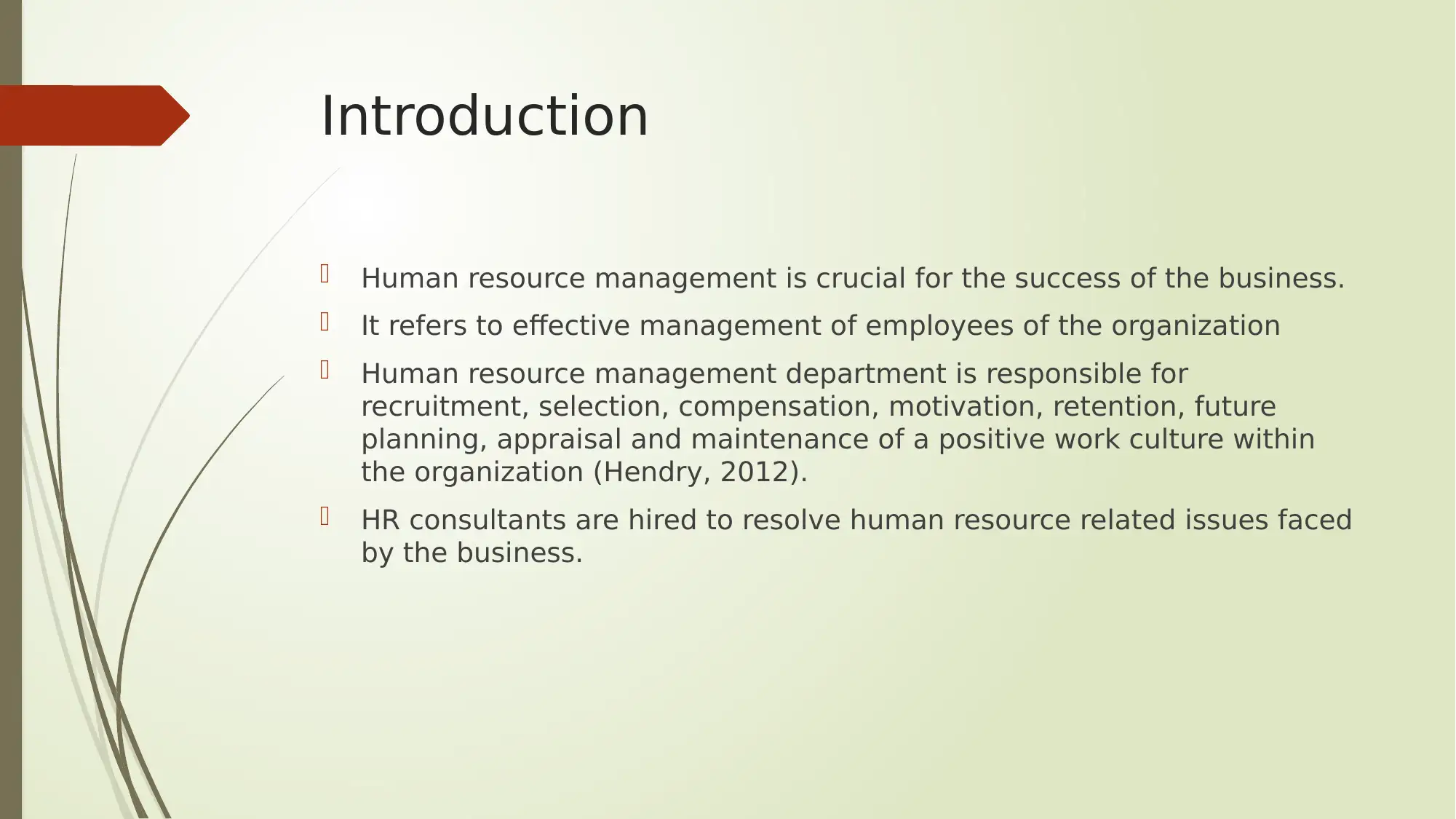
Introduction
Human resource management is crucial for the success of the business.
It refers to effective management of employees of the organization
Human resource management department is responsible for
recruitment, selection, compensation, motivation, retention, future
planning, appraisal and maintenance of a positive work culture within
the organization (Hendry, 2012).
HR consultants are hired to resolve human resource related issues faced
by the business.
Human resource management is crucial for the success of the business.
It refers to effective management of employees of the organization
Human resource management department is responsible for
recruitment, selection, compensation, motivation, retention, future
planning, appraisal and maintenance of a positive work culture within
the organization (Hendry, 2012).
HR consultants are hired to resolve human resource related issues faced
by the business.
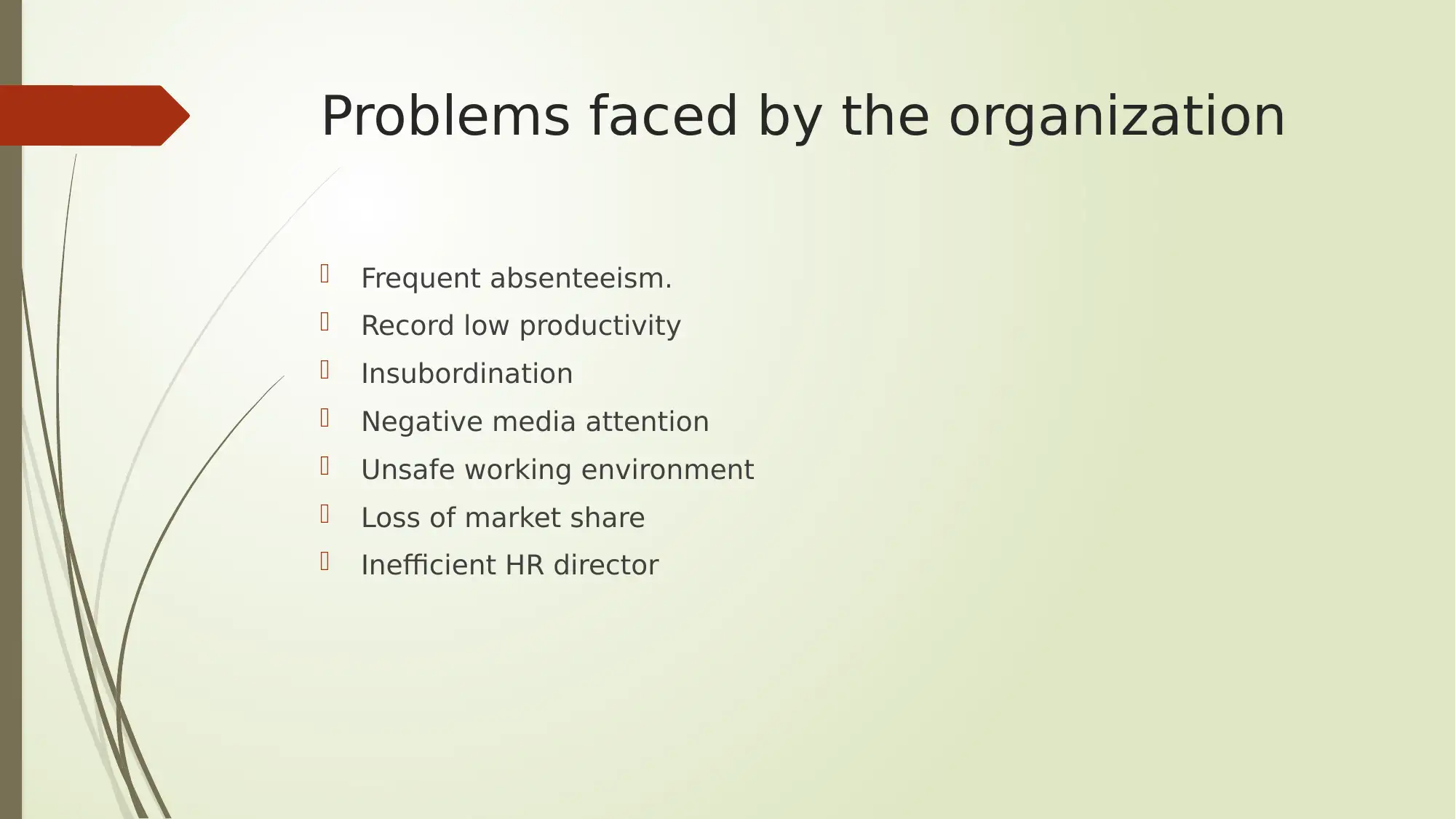
Problems faced by the organization
Frequent absenteeism.
Record low productivity
Insubordination
Negative media attention
Unsafe working environment
Loss of market share
Inefficient HR director
Frequent absenteeism.
Record low productivity
Insubordination
Negative media attention
Unsafe working environment
Loss of market share
Inefficient HR director
⊘ This is a preview!⊘
Do you want full access?
Subscribe today to unlock all pages.

Trusted by 1+ million students worldwide
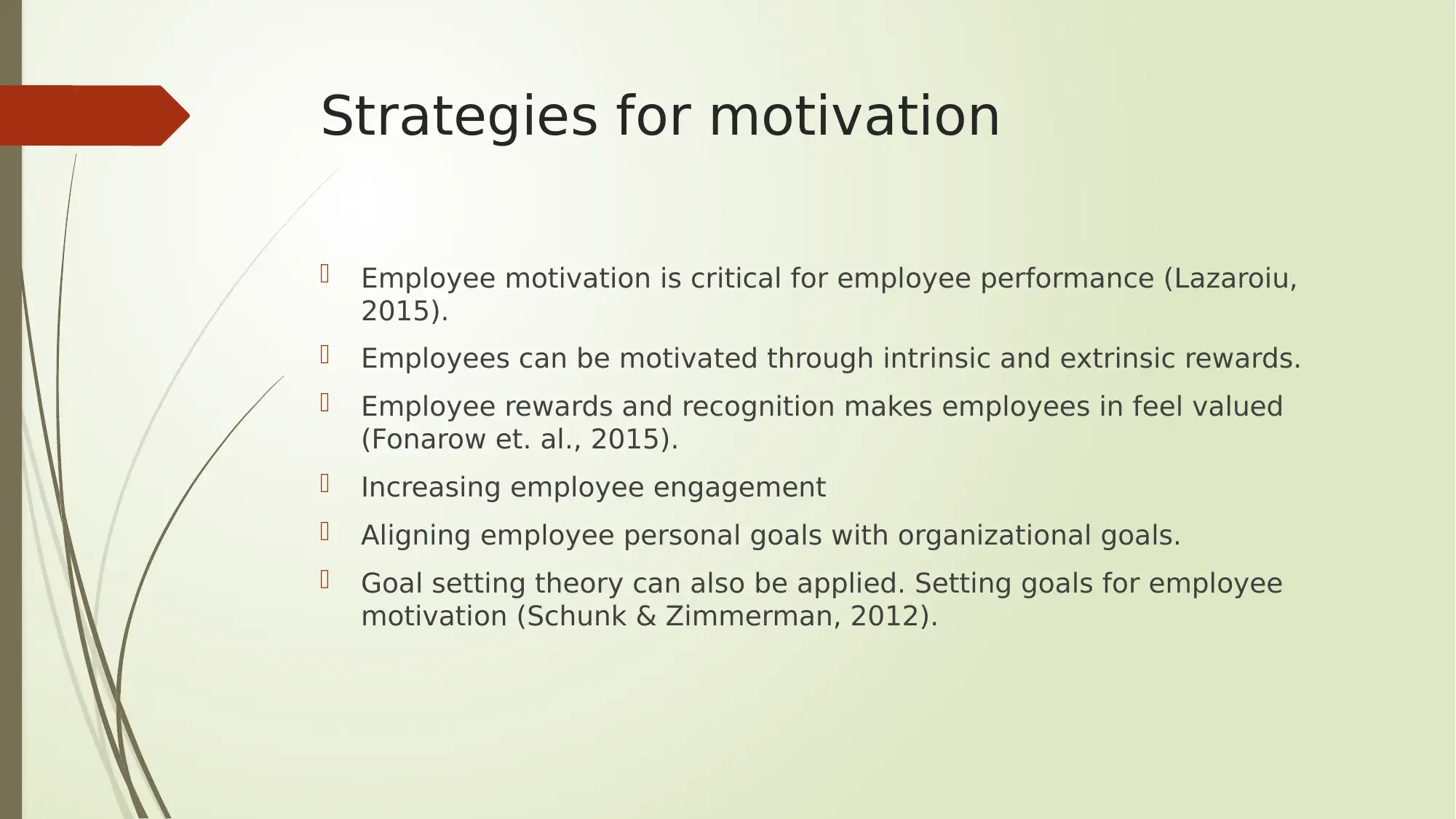
Strategies for motivation
Employee motivation is critical for employee performance (Lazaroiu,
2015).
Employees can be motivated through intrinsic and extrinsic rewards.
Employee rewards and recognition makes employees in feel valued
(Fonarow et. al., 2015).
Increasing employee engagement
Aligning employee personal goals with organizational goals.
Goal setting theory can also be applied. Setting goals for employee
motivation (Schunk & Zimmerman, 2012).
Employee motivation is critical for employee performance (Lazaroiu,
2015).
Employees can be motivated through intrinsic and extrinsic rewards.
Employee rewards and recognition makes employees in feel valued
(Fonarow et. al., 2015).
Increasing employee engagement
Aligning employee personal goals with organizational goals.
Goal setting theory can also be applied. Setting goals for employee
motivation (Schunk & Zimmerman, 2012).
Paraphrase This Document
Need a fresh take? Get an instant paraphrase of this document with our AI Paraphraser
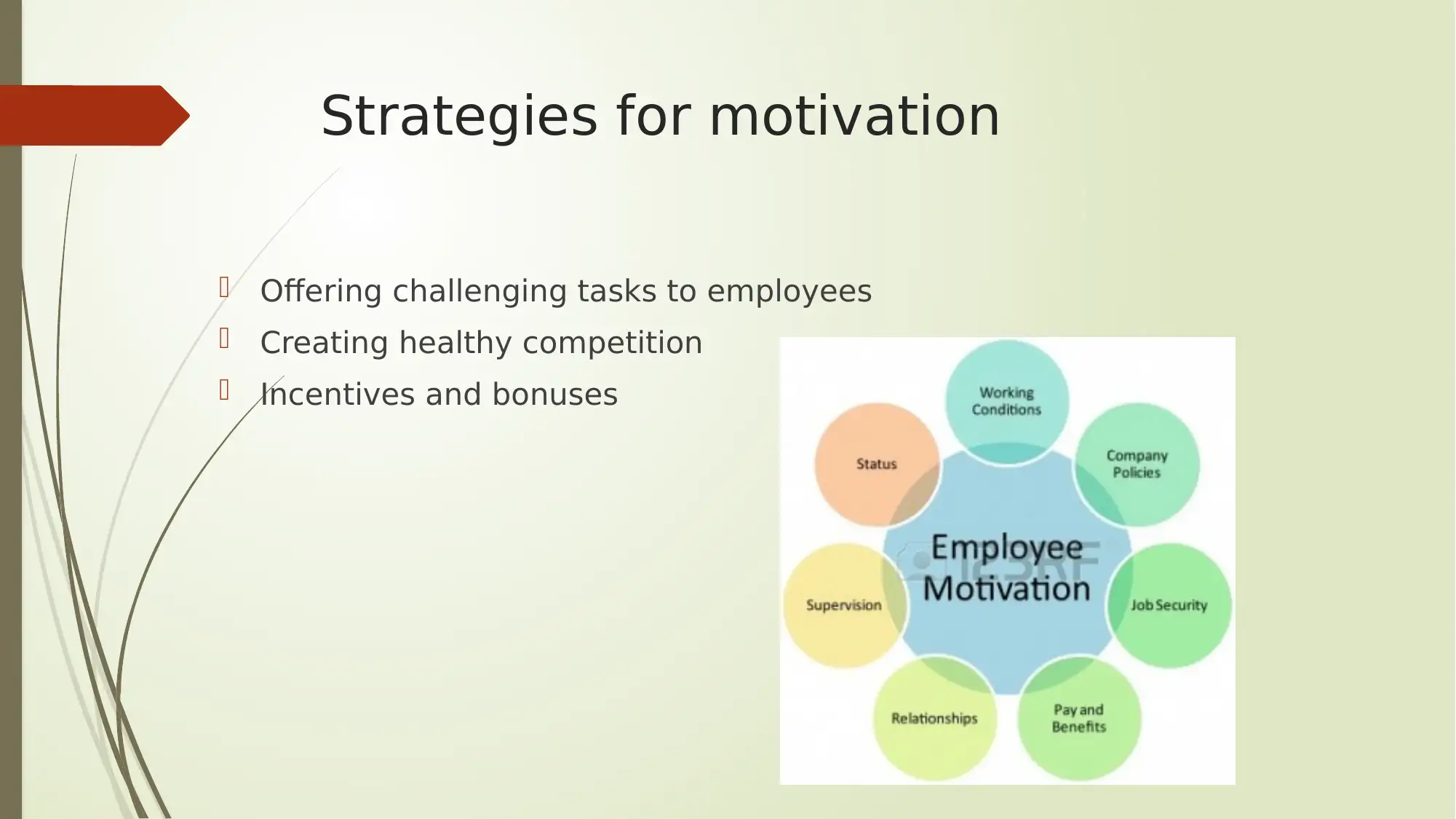
Strategies for motivation
Offering challenging tasks to employees
Creating healthy competition
Incentives and bonuses
Offering challenging tasks to employees
Creating healthy competition
Incentives and bonuses
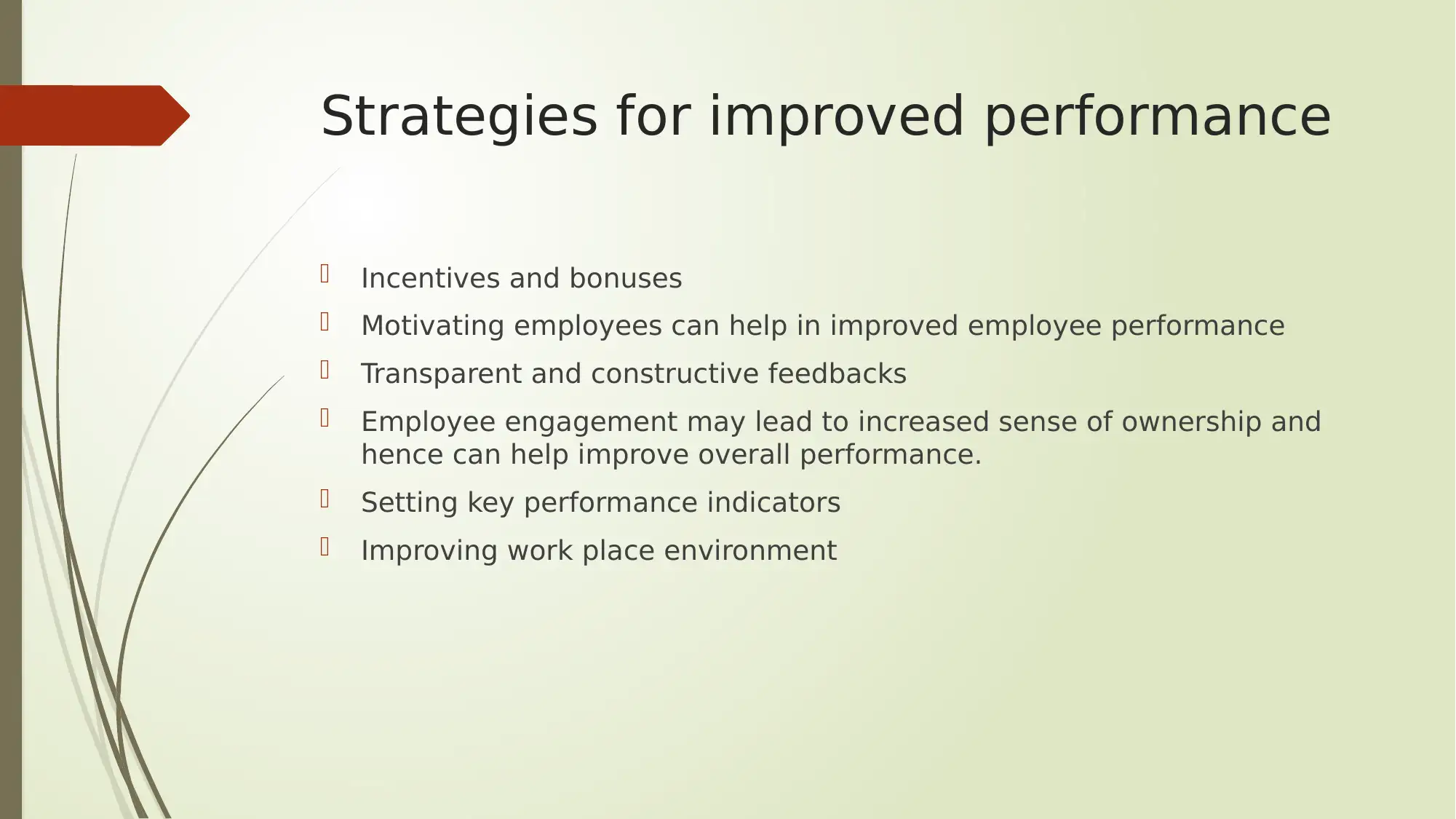
Strategies for improved performance
Incentives and bonuses
Motivating employees can help in improved employee performance
Transparent and constructive feedbacks
Employee engagement may lead to increased sense of ownership and
hence can help improve overall performance.
Setting key performance indicators
Improving work place environment
Incentives and bonuses
Motivating employees can help in improved employee performance
Transparent and constructive feedbacks
Employee engagement may lead to increased sense of ownership and
hence can help improve overall performance.
Setting key performance indicators
Improving work place environment
⊘ This is a preview!⊘
Do you want full access?
Subscribe today to unlock all pages.

Trusted by 1+ million students worldwide
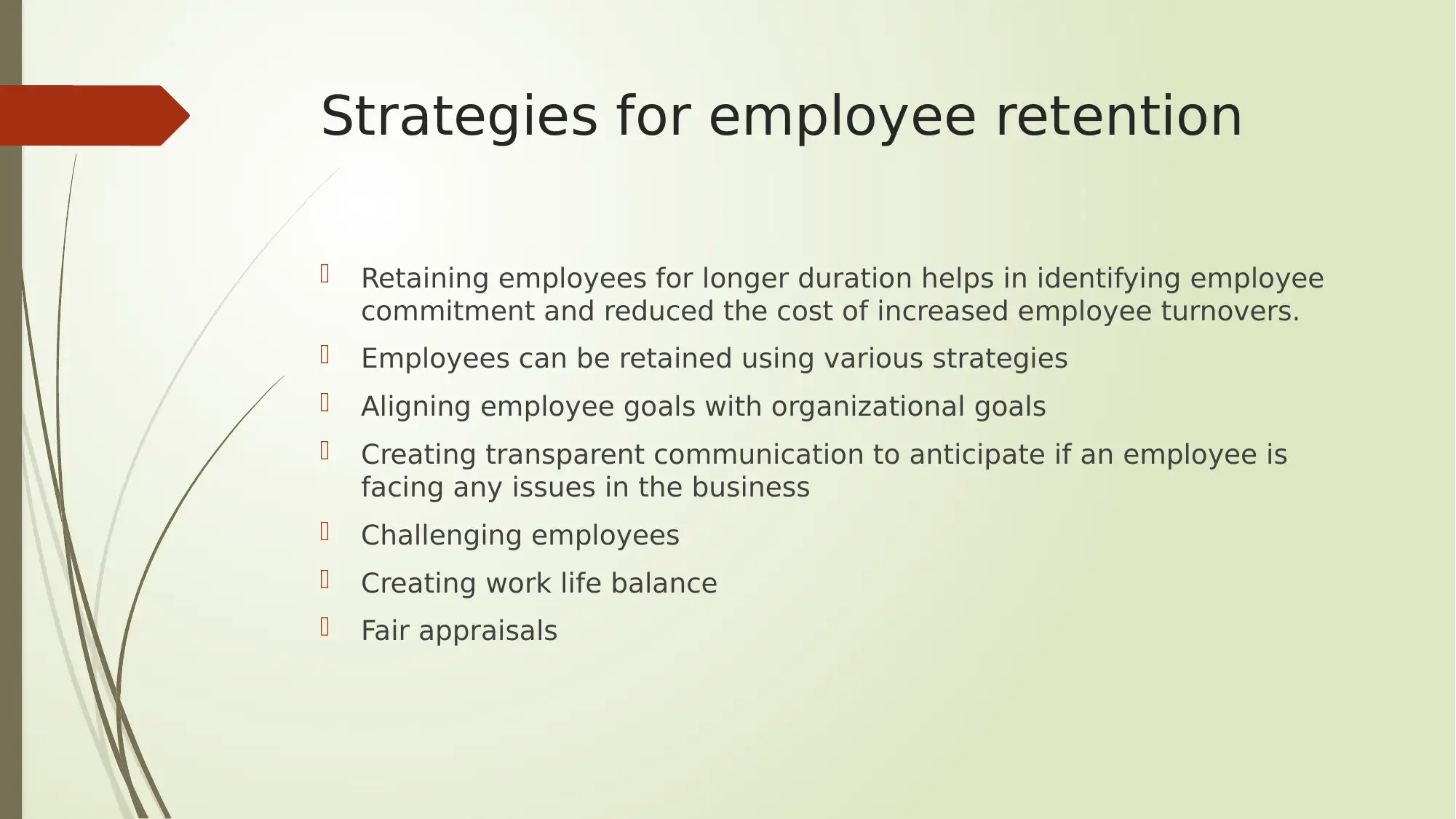
Strategies for employee retention
Retaining employees for longer duration helps in identifying employee
commitment and reduced the cost of increased employee turnovers.
Employees can be retained using various strategies
Aligning employee goals with organizational goals
Creating transparent communication to anticipate if an employee is
facing any issues in the business
Challenging employees
Creating work life balance
Fair appraisals
Retaining employees for longer duration helps in identifying employee
commitment and reduced the cost of increased employee turnovers.
Employees can be retained using various strategies
Aligning employee goals with organizational goals
Creating transparent communication to anticipate if an employee is
facing any issues in the business
Challenging employees
Creating work life balance
Fair appraisals
Paraphrase This Document
Need a fresh take? Get an instant paraphrase of this document with our AI Paraphraser
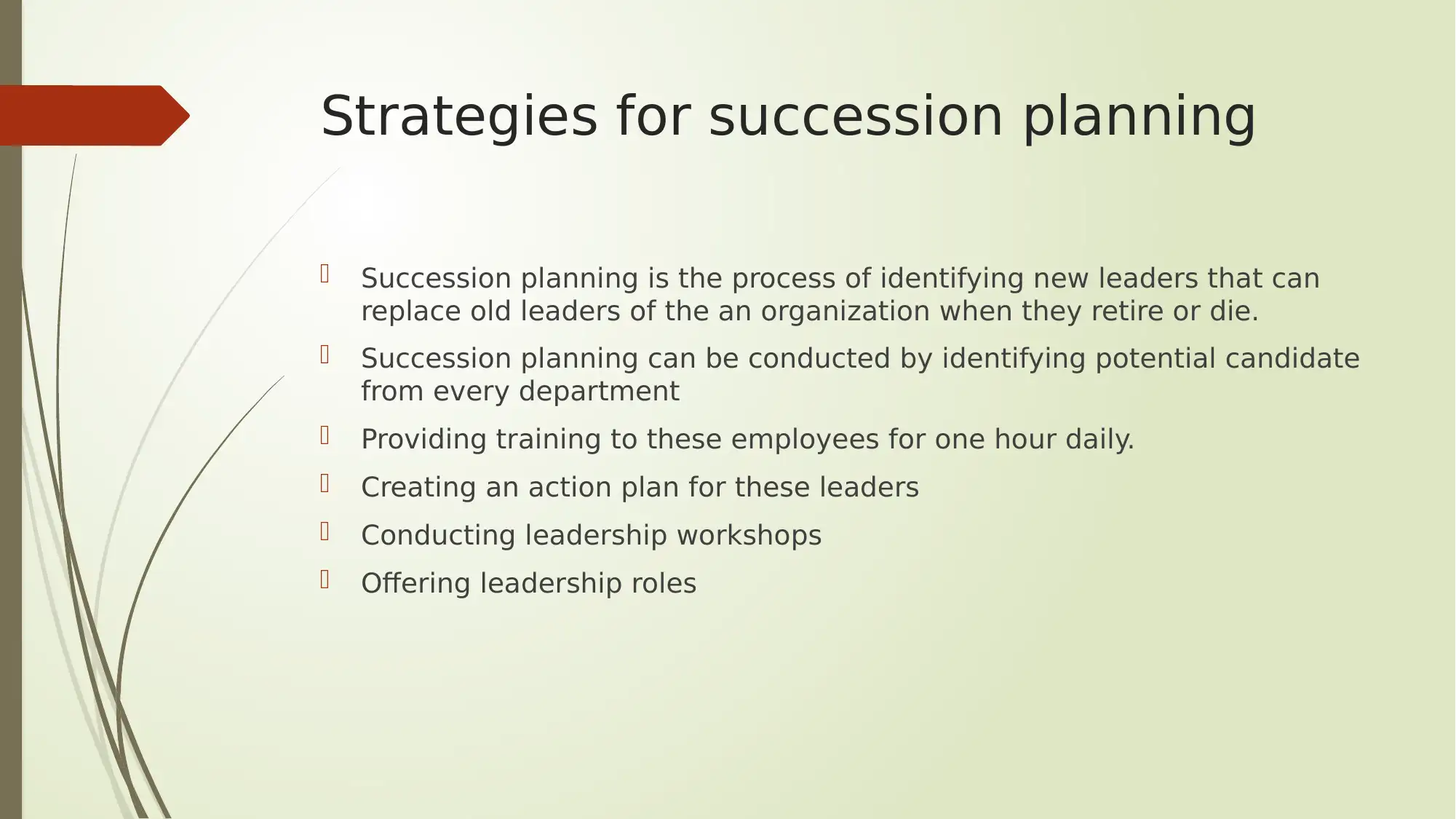
Strategies for succession planning
Succession planning is the process of identifying new leaders that can
replace old leaders of the an organization when they retire or die.
Succession planning can be conducted by identifying potential candidate
from every department
Providing training to these employees for one hour daily.
Creating an action plan for these leaders
Conducting leadership workshops
Offering leadership roles
Succession planning is the process of identifying new leaders that can
replace old leaders of the an organization when they retire or die.
Succession planning can be conducted by identifying potential candidate
from every department
Providing training to these employees for one hour daily.
Creating an action plan for these leaders
Conducting leadership workshops
Offering leadership roles
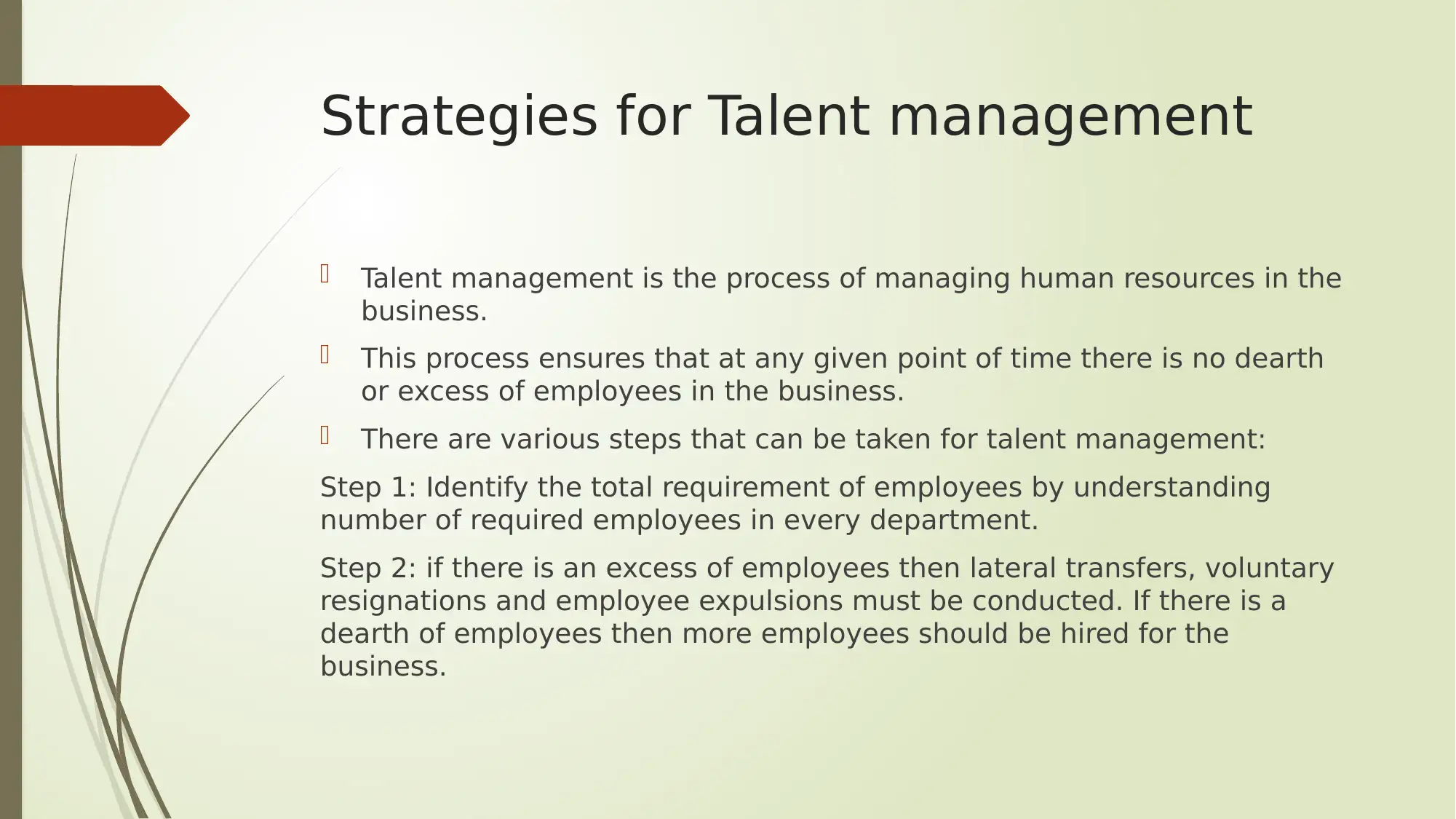
Strategies for Talent management
Talent management is the process of managing human resources in the
business.
This process ensures that at any given point of time there is no dearth
or excess of employees in the business.
There are various steps that can be taken for talent management:
Step 1: Identify the total requirement of employees by understanding
number of required employees in every department.
Step 2: if there is an excess of employees then lateral transfers, voluntary
resignations and employee expulsions must be conducted. If there is a
dearth of employees then more employees should be hired for the
business.
Talent management is the process of managing human resources in the
business.
This process ensures that at any given point of time there is no dearth
or excess of employees in the business.
There are various steps that can be taken for talent management:
Step 1: Identify the total requirement of employees by understanding
number of required employees in every department.
Step 2: if there is an excess of employees then lateral transfers, voluntary
resignations and employee expulsions must be conducted. If there is a
dearth of employees then more employees should be hired for the
business.
⊘ This is a preview!⊘
Do you want full access?
Subscribe today to unlock all pages.

Trusted by 1+ million students worldwide
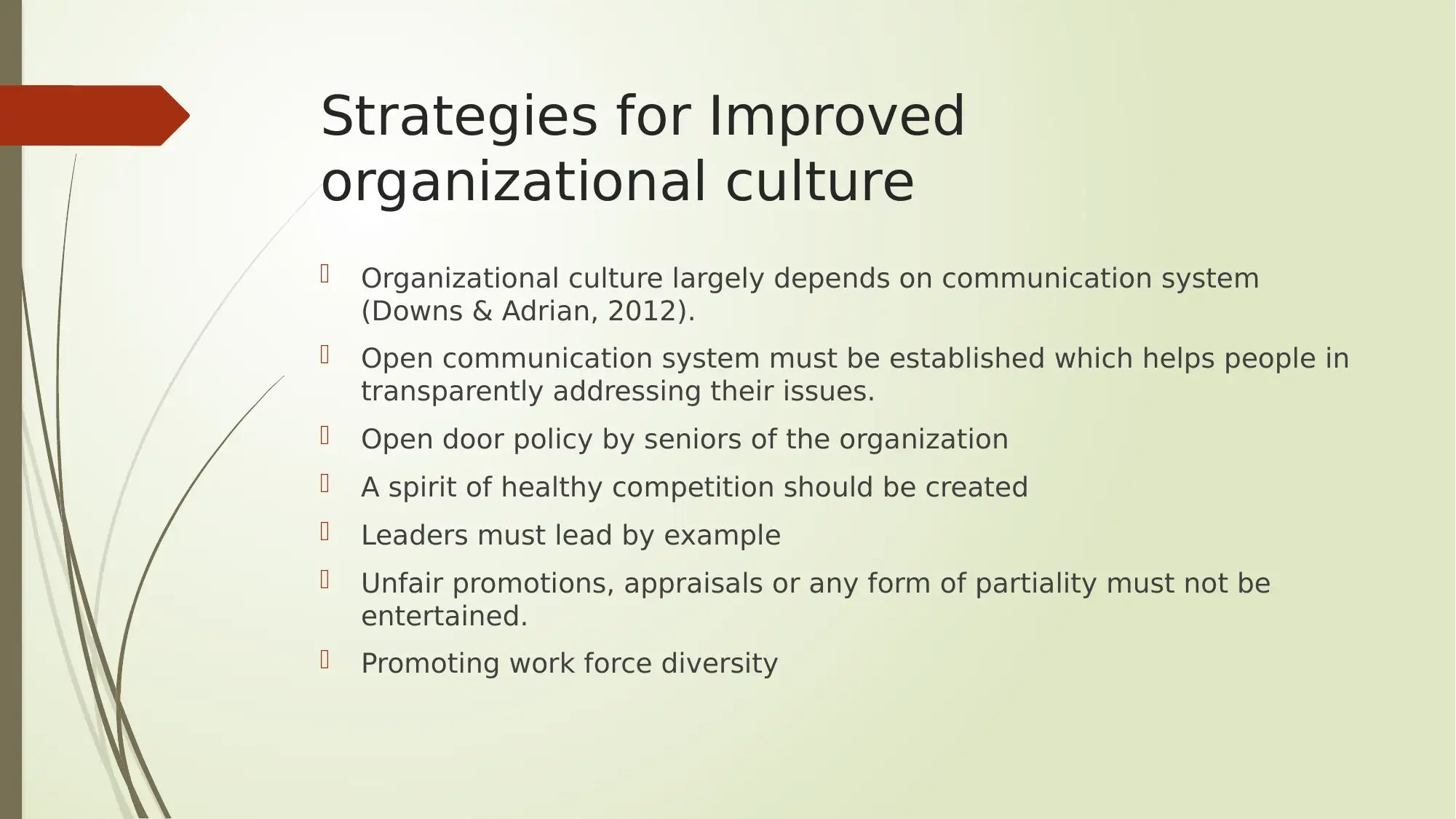
Strategies for Improved
organizational culture
Organizational culture largely depends on communication system
(Downs & Adrian, 2012).
Open communication system must be established which helps people in
transparently addressing their issues.
Open door policy by seniors of the organization
A spirit of healthy competition should be created
Leaders must lead by example
Unfair promotions, appraisals or any form of partiality must not be
entertained.
Promoting work force diversity
organizational culture
Organizational culture largely depends on communication system
(Downs & Adrian, 2012).
Open communication system must be established which helps people in
transparently addressing their issues.
Open door policy by seniors of the organization
A spirit of healthy competition should be created
Leaders must lead by example
Unfair promotions, appraisals or any form of partiality must not be
entertained.
Promoting work force diversity
Paraphrase This Document
Need a fresh take? Get an instant paraphrase of this document with our AI Paraphraser
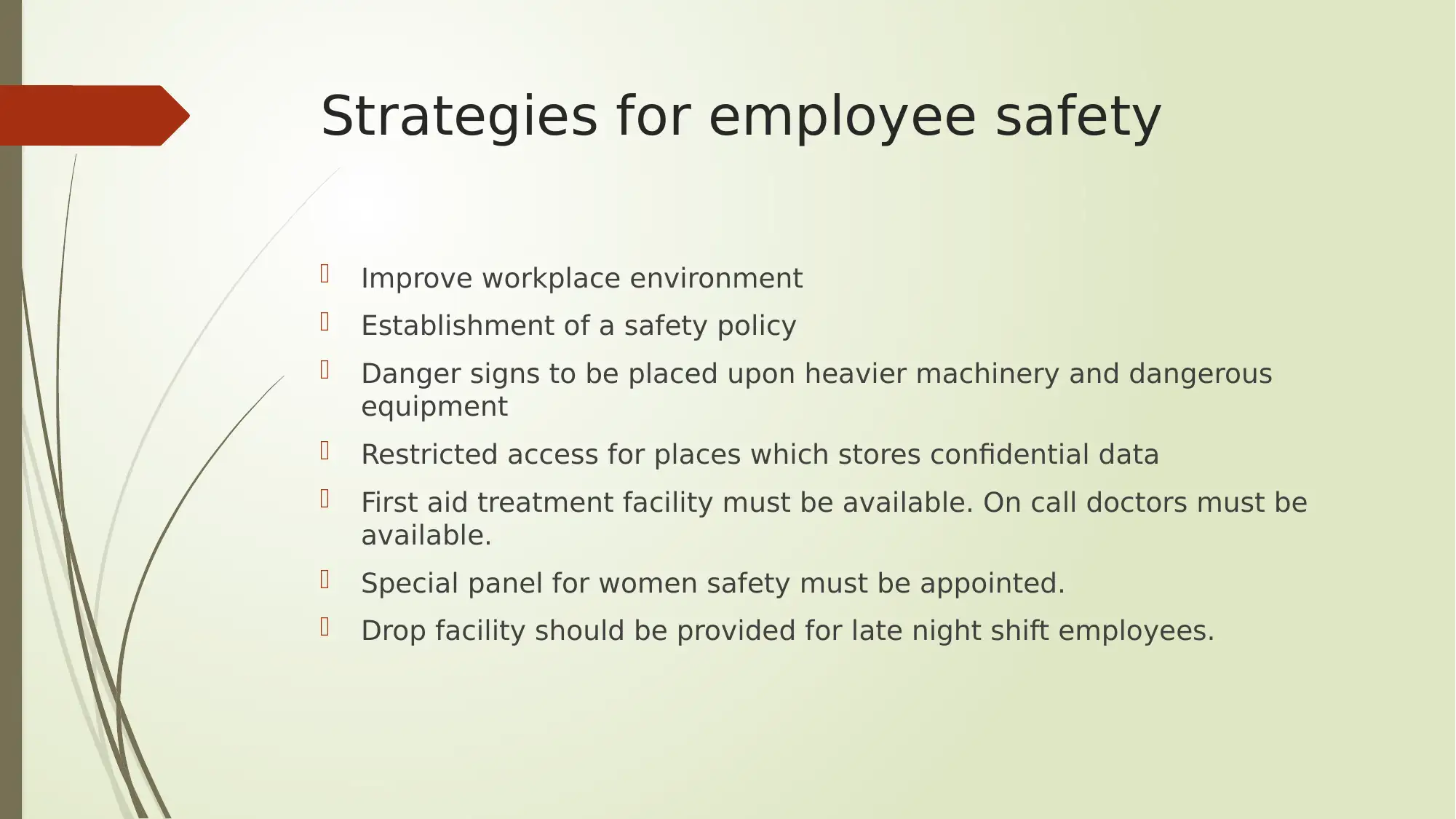
Strategies for employee safety
Improve workplace environment
Establishment of a safety policy
Danger signs to be placed upon heavier machinery and dangerous
equipment
Restricted access for places which stores confidential data
First aid treatment facility must be available. On call doctors must be
available.
Special panel for women safety must be appointed.
Drop facility should be provided for late night shift employees.
Improve workplace environment
Establishment of a safety policy
Danger signs to be placed upon heavier machinery and dangerous
equipment
Restricted access for places which stores confidential data
First aid treatment facility must be available. On call doctors must be
available.
Special panel for women safety must be appointed.
Drop facility should be provided for late night shift employees.
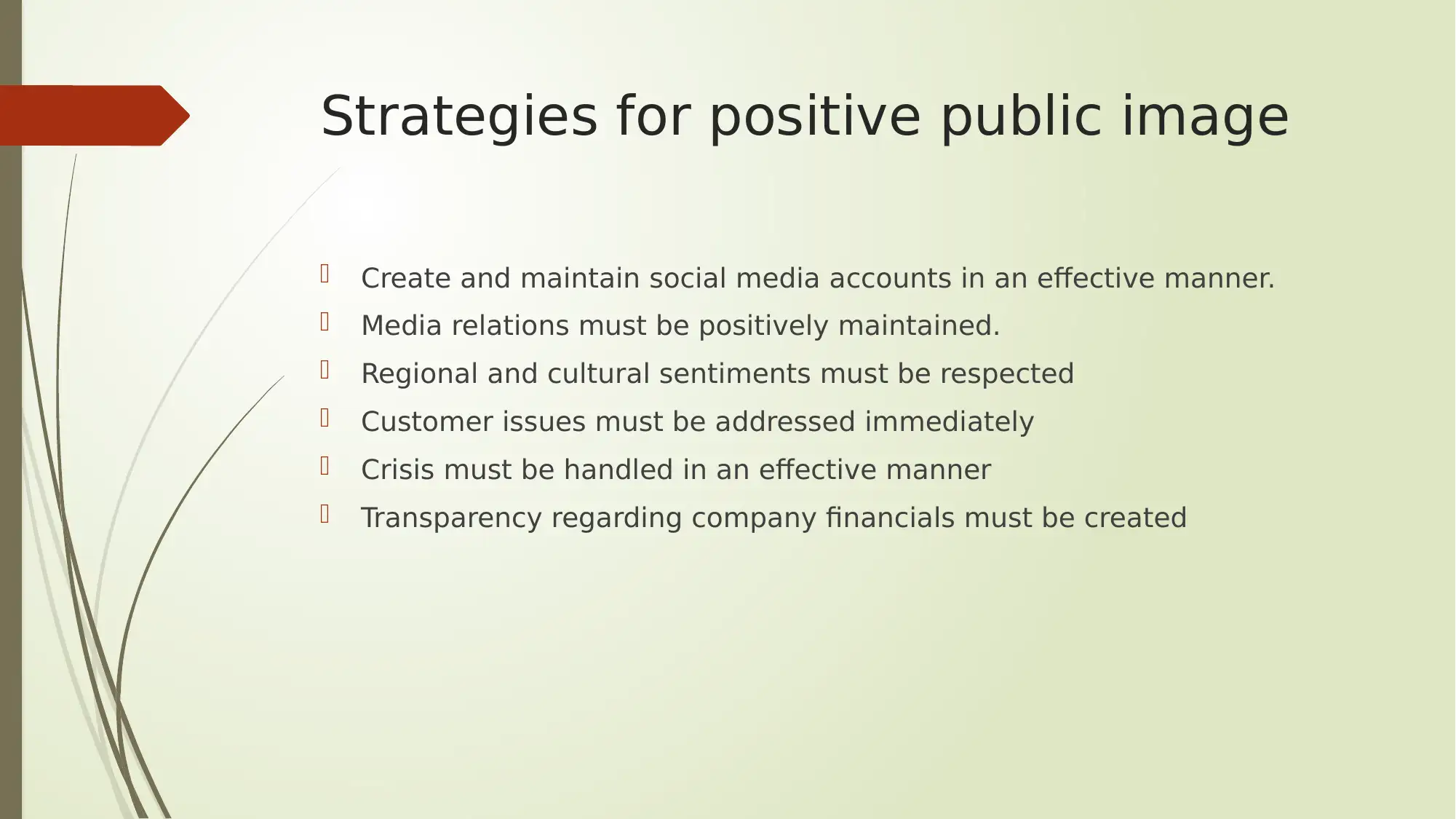
Strategies for positive public image
Create and maintain social media accounts in an effective manner.
Media relations must be positively maintained.
Regional and cultural sentiments must be respected
Customer issues must be addressed immediately
Crisis must be handled in an effective manner
Transparency regarding company financials must be created
Create and maintain social media accounts in an effective manner.
Media relations must be positively maintained.
Regional and cultural sentiments must be respected
Customer issues must be addressed immediately
Crisis must be handled in an effective manner
Transparency regarding company financials must be created
⊘ This is a preview!⊘
Do you want full access?
Subscribe today to unlock all pages.

Trusted by 1+ million students worldwide
1 out of 16
Related Documents
Your All-in-One AI-Powered Toolkit for Academic Success.
+13062052269
info@desklib.com
Available 24*7 on WhatsApp / Email
![[object Object]](/_next/static/media/star-bottom.7253800d.svg)
Unlock your academic potential
Copyright © 2020–2026 A2Z Services. All Rights Reserved. Developed and managed by ZUCOL.





